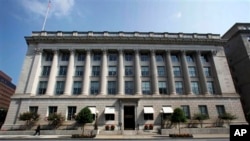A government agency that helps U.S. companies export goods could go out of business at the end of June unless Congress takes action to approve a new charter. But a key leader in the House of Representatives says no vote is planned on the matter.
The Export-Import Bank (Ex-Im) helps U.S. companies with financing and a type of insurance that protects firms in case a foreign customer cannot pay. The companies pay premiums or interest for these services, and Ex-Im officials say they have made hundreds of millions of dollars for the U.S. Treasury and have helped create thousands of jobs.
Ex-Im has been targeted for elimination by some conservative Republicans who say the agency is an unwise intrusion into processes better left to the market. In congressional hearings and speeches, Rep. Jeb Hensarling said the agency provides “corporate welfare” for huge companies that don’t need and shouldn’t get government help.
But Democrats, including Rep. Maxine Waters, and House Minority Whip Steny Hoyer, say a majority of members of the House of Representatives support the bank and they have been trying to get the Republicans who control the House allow a vote.
That request appeared to be going nowhere on the House floor Thursday, as Republican Kevin McCarthy, the Majority Leader, said “there is no action [on Ex-Im] pending before the house."
That drew sharp criticism from Democratic Rep. Hoyer, who said letting Ex-Im expire leaves U.S. companies at a disadvantage because their foreign rivals will continue to get help from their governments.
"How sad it is that we don't bring to the floor a bill that like 85 other countries, 85 other countries, help us export goods," he said. "Those 85 countries, Mr. Speaker, are not going to stop helping their countries export goods."
Earlier this week, Jeff Immelt, Chairman of General Electric, said he may move jobs out of the United States to Canada or Europe if Congress lets the U.S. Export-Import Bank go out of business.
GE is a major recipient of Ex-Im help. Immelt says if his company does not get help from the U.S. Ex-Im Bank, he may move some production to nations that do provide export aid.
Critics say most of Ex-Im’s aid goes to large companies. But the president of an ice cream company that employs about 30 people calls the end of the bank “terrifying.” Michael Strange runs Bassetts Ice Cream in Philadelphia and exports one-fifth of his production to China. He says that would be very difficult without the payment insurance he buys from Ex-Im.
But economist Claude Barfield, a trade expert at the conservative American Enterprise Institute, says companies would not be hurt “dramatically” by the end of the bank. He says the sorts of subsidies offered by the bank are bad economics and should be allowed only after rival nations offer them to their companies in direct competition with U.S. firms.





